Nowadays, there is a multitude of alternative ways to be healthy, such as meditative exercises, massages, and alternative medicine. If you’re updated with the latest news, you’ve probably heard of cannabidiol (CBD) and related products and the various perks and advantages they bring. Unfortunately, CBD oil is not that popular as an alternative medicine in other countries, especially because of its association with marijuana. Why is this so? What caused CBD to get its notoriety today?
What Is Cannabidiol?
It might help to know more about cannabidiol (CBD) before tackling why it’s controversial worldwide. CBD is growing in popularity as a natural remedy because of its supposed benefits. These include anti-inflammation and relief of pain and anxiety, among others. What perhaps makes it all the more interesting is that it’s one of 104 cannabidiols, or compounds, of the marijuana plant, also known as cannabis.
In its most basic sense, the reason for the flak behind CBD is its association with marijuana, especially because CBD also contains tetrahydrocannabinol, or THC. THC is a psychoactive compound in plants that causes the “high” sensation when people consume marijuana-based products. Interestingly, CBD actually doesn’t exhibit this psychoactive effect.
CBD Oil: The Real Score Behind Its Reputation
Given the “relationship” of CBD to marijuana, it’s not a surprise for CBD to get a bad reputation. Hence, if you want to use CBD oil, you need to be aware of the policies in your region with regard to the usage of CBD. For instance, policies for CBD in Canada can be different compared with the policies in other countries. Knowing these can save you from any trouble. Here are some more reasons why CBD is highly controversial and, thus, regulated in some parts of the world:
- CBD is associated with marijuana and its reputation: Given CBD is a cannabinoid, it’s associated with marijuana, which is generally addictive when consumed without care. Substance dependence and withdrawal have been observed with marijuana users, and those who become “addicted” to marijuana are unable to control their substance use. As such, these individuals tend to make unhealthy decisions.
- Widespread CBD use may impact overall public safety: Although marijuana users have been touted as “unmotivated” and “lazy” in contrast to the mania of an LSD user or a cocaine addict, all of these drugs significantly affects the users and how society views them because of the mind-altering effects of these substances. Even though the push for the legalization of the recreational use of marijuana is getting strong in a lot of states, professionals from various sectors are still lamenting about the potential abuse and usage of dangerous drugs, including marijuana.
- The case of CNN and Charlotte Figi: Perhaps what started to have people talking about CBD was when CNN did a coverage on the story of Charlotte Figi, who was an epilepsy patient in Colorado. Figi, who was five years old at the time, had an average of 300 seizures a week. CNN got a hold of her when it was discovered she apparently had a huge reduction in seizures when she consumed cannabis oil. When Figi’s parents asked to find what helped her child, it was discovered that she had high levels of CBD but low levels of THC. This made a lot of people believe that CBD may have therapeutic potential.
- The Controlled Substances Act of US Federal Law: Another point of interest is how the Controlled Substances Act (CSA) of the United States is in charge of establishing policies with the distribution, sale, use, possession, importation, and manufacture of certain substances. In the CSA, all regulated substances are placed in one of five “schedules” based on dependence liability, safety, potential for abuse, and medical use. Normally, products and substances derived from a substance fall under the same schedule. Marijuana in itself is under Schedule 1, which means it follows a particular production quota and is technically banned from being sold commercially. This is interesting, since Washington D.C. and 29 other states legalized the use of medical marijuana. What’s more, stalks and products from those parts aren’t “illegal” given they’re not directly marijuana, and CBD itself isn’t listed in here as well.
- The Drug Enforcement Administration says CBD is a Schedule I substance: Building upon the above, the DEA does insist that CBD oil is under the CSA’s Schedule 1 substance category. This means it has no “accepted” medical use. However, CBD isn’t listed in the federal schedule and cannot be sold given it’s a controlled substance. Regardless, CBD created from sterilized seeds, cake, fibers, and mature stalks is still okay for selling, as per the revised stance. This essentially excludes it from being an extract of marijuana, which is a contradiction to its first position.
- Getting drug classification and not getting one: Interestingly, the status of CBD as a drug or a nondrug can also affect its usage. For instance, supplement brands with CBD can’t make any claims of cures and treatments whenever they market their products, given only drugs are allowed to make such claims. Should CBD be classified as a drug, the US Congress can pave the way to make CBD legal and resolve legal issues surrounding its distribution and sale.
The Bottom Line: CBD Oil Trust Really Depends on the User
From the discussion above, it is understandable why some people frown upon the usage of CBD oil, primarily because of its association with marijuana. However, it’s also important for people to understand what CBD really is and how it can affect the body, before judging whether or not CBD will be of use to them. It’s also important to go check with a doctor first before buying any CBD products to know whether or not it’s safe for you to consume, especially if you have existing medical conditions. Safety first.








